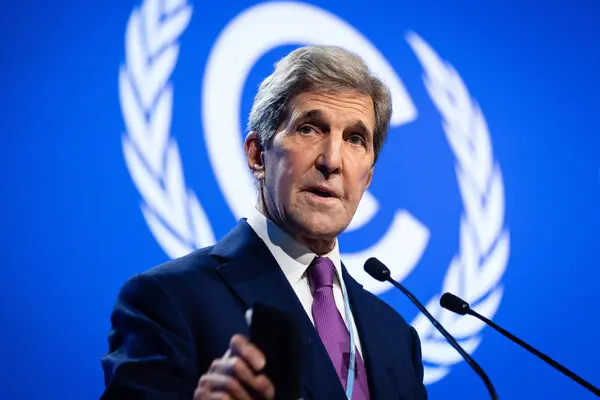The United States’ special presidential envoy for climate change, John Kerry, stated on Friday that there are still environmental threats related to climate change and the oceans, but he praised the UN’s efforts to address them as well as the support it is getting from Middle Eastern countries like Saudi Arabia, the UAE, Kuwait, and Bahrain.
Since 1995, the UN has organized an annual Climate Change Conference, also known as COP (short for Conference of the Parties to the UN Framework Convention on Climate Change), to address environmental issues. Four of these meetings have taken place in the Arab World: COP7 and COP22 in Marrakech, Morocco, in 2001 and 2016; COP 18 in Doha, Qatar, in 2012; and COP27 in Sharm El-Sheikh, Egypt, in 2022.
Kerry made the announcement while praising the significant assistance the UN has received from oil-producing countries in the Gulf region, such as Saudi Arabia and the UAE. This year’s COP 28 will take place from November 30 to December 12 in Dubai.
“Last year, the UAE held the first-ever regional conference on the climate and the issues of fossil fuels, and we had 11 countries there from the region,” he said.
The envoy painted an ominous picture of what the future might hold for the environment if climate goals are not achieved, and warned that more needs to be done. He said the efforts are helped significantly by having the oil-producing nations in the Middle East engaged and “fully committed.”
Read Also: climate-change-conservatives-at-us-conference-divided
“The world is not living sustainably and if you look at history, civilizations have disappeared due to that reality,” Kerry said, adding that many nations “don’t respect” the effects they are having on climate change.
“The basics of our relationship to nature are critical … We have lost half the species on the planet and we are not headed in the right direction. We need a treaty,” he added.
There is compelling evidence pointing to the “real possibility” that we have already passed several “tipping points” in the battle against climate change: Barents Sea ice is disappearing as the planet warms; coral reefs are dying as a result of increasing pollution and warming; the permafrost is thawing, producing massive amounts of methane gas as a result; and temperatures are rising significantly in the Arctic and Antarctic.
“The rate of melting is threatening enough that the Greenland ice sheet might disappear,” Kerry said, which could raise sea levels by 7 meters, alter dominant currents and cause massive changes in weather patterns.
Speaking of the importance of Arab World involvement in the discussions relating to climate change and the environment, Kerry said: “One of the virtues, conceivably, is the question does it help us to have a country that is familiar with oil and gas, and that has leverage within that community, that is committed to doing these things I have just described. My view is it has the potential to be extremely important.
He said it is “emissions from fossil fuels that fall into the ocean in rainfall and raise the acidity” levels of the waters, added: “We have been, over the years, changing the chemistry of the ocean more than it has been changed in millions of years. That is a scientific conclusion by oceanographers and ocean marine biologists and others.”
Kerry said he will attend the 41st annual CERAWeek energy conference in Houston, Texas, next week, and meet officials from the Middle East, including Haitham Al-Ghais, the secretary general of OPEC, and Sultan Ahmed Al-Jaber, the UAE’s special envoy for climate change.
Story adapted from Arab News
